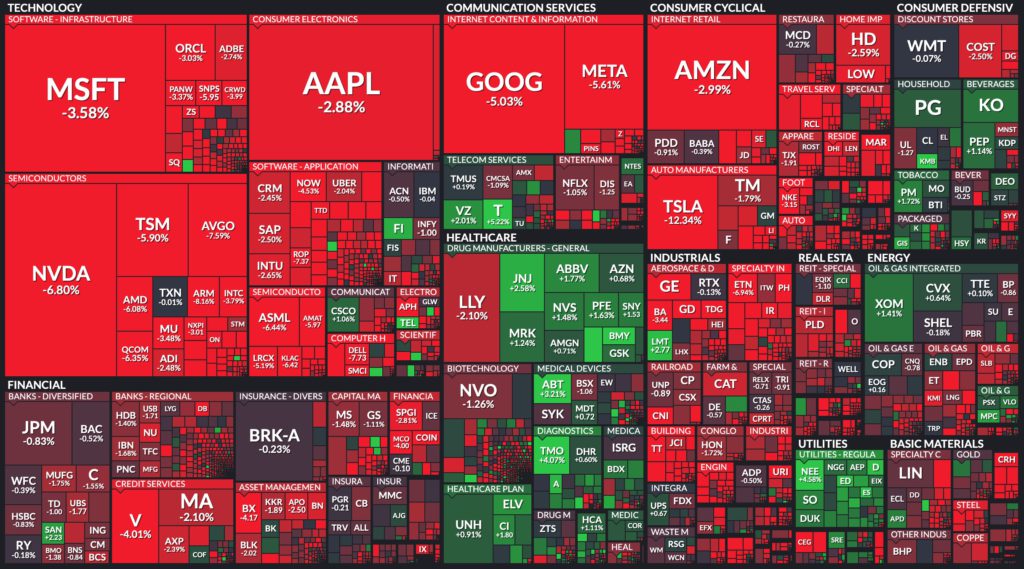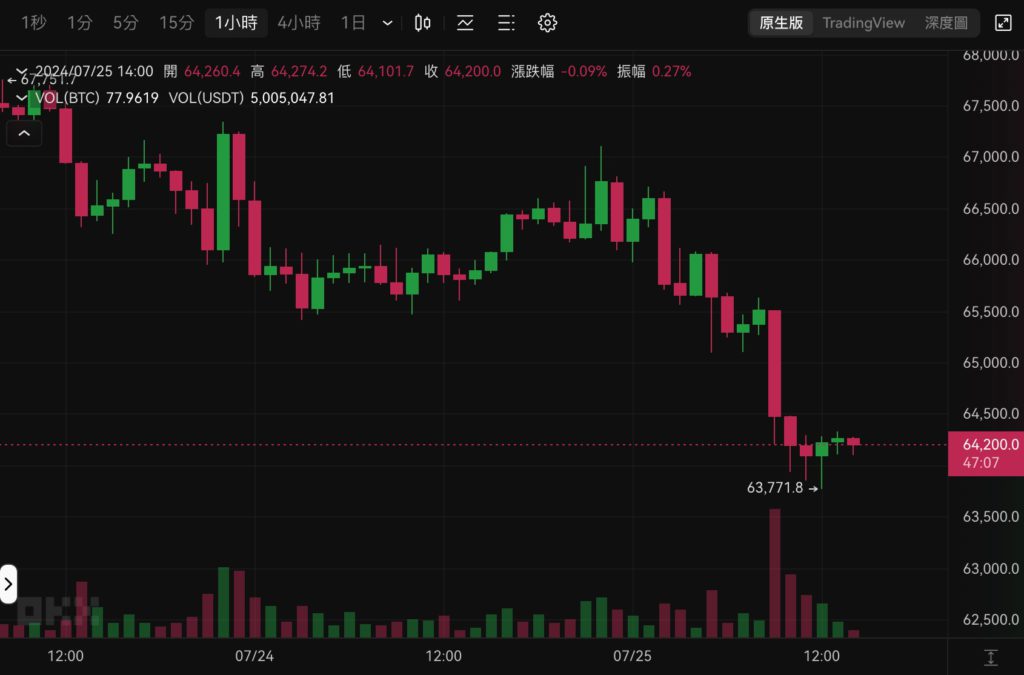In the first half of this year , the AI craze has driven U.S. stocks to record highs. However, investors have recently become more worried about the decline of technology stocks. Yesterday, U.S. stocks experienced "Black Wednesday". The seven major U.S. stocks fell sharply in unison, and the Nasdaq index plummeted. More than 3%, the largest single-day decline since the end of 2022.
In terms of the Big Seven: Tesla plunged 12.33%, the largest single-day decline since September 2020, Huida fell 6.8%, Meta fell 5.61%, Alphabet fell 5%, Microsoft fell 3.6%, and Amazon fell 2.99% , Apple also fell 2.88%.
All four major U.S. stock indexes plunged:
- The Nasdaq index fell 654.94 points, or 3.6%, to close at 17,342.41 points
- The S&P 500 index fell 128.61 points, or 2.3%, to close at 5,427.13 points
- The Dow Jones Industrial Average fell 504.22 points, or 1.25%, to close at 39,853.87 points
- The Philadelphia Semiconductor Index fell 292.24 points, or 5.41%, to close at 5,105.65 points

Amid the market crash, the panic index VIX soared 22.55% to 18.04, hitting a new high in the past three months. Joe Tigay, portfolio manager of Rational Equity Armor Fund, believes:
People are starting to wake up to the fact that volatility is possible, but don’t seem to be fully adjusting their positions yet.
Why did the market plummet?
One reason for the sharp decline in U.S. stocks this time was the disappointing financial results released by Tesla and Alphabet. Tesla's second-quarter financial results after the market closed on Tuesday were unsatisfactory. Although it achieved a record quarterly revenue of US$25.5 billion, electric vehicle sales fell for two consecutive quarters, profit margins fell to the lowest in five years, and profits fell by double digits. , triggering market concerns about Tesla's profitability.
At the same time, Alphabet’s revenue last quarter increased by 14% year-on-year to US$84.7 billion, and net profit increased by 28% year-on-year to US$23.6 billion. Although higher than market expectations, YouTube advertising revenue only increased by 13% to US$8.7 billion, which is not as good as the analysis Analysts expect that the company's top executives also mentioned that this quarter's profits may be affected by pressure from equipment depreciation and AI expenditures, causing market concerns.
CLSA Securities Korea analyst Sanjeev Rana said
The market is worried that this year's ultra-large capital expenditure growth may not have room for further increase, and the revenue growth trend from generative AI is lower than expected, which is the reason for the retreat of US AI stocks.
The U.S. stock market earnings season has just begun, and Apple, Microsoft, Amazon, and Meta will all announce earnings next week. If the earnings results of these giants are not as good as expected, it may cause the market to fall further.
Bitcoin fell due to impact
It is worth noting that against the backdrop of the sharp decline in U.S. stocks, Bitcoin also fell below $64,000 today, with a single-day drop of more than 3%, reaching as deep as $63,771, setting a new low since July 19.
In addition to the plunge in technology stocks, the reason for the decline may also be related to more Mt. Gox creditors receiving BTC compensation and starting to sell.

Mt.Gox bankruptcy repayment advances
The Mt. Gox bankruptcy trustee issued an announcement stating that following July 5 and July 16, the bankruptcy trustee had repaid BTC and BCH to some creditors to the designated cryptocurrency exchange according to the reorganization plan on July 24. As of Currently, more than 17,000 creditors have been paid via Bitcoin and Bitcoin Cash.
Regarding the repayment progress of other creditors, the Mt. Gox bankruptcy trustee stated that it will confirm the validity of the accounts registered by creditors, etc., and verify the designated cryptocurrency transactions. Creditors will need to wait for a while.
The Mt.Gox address was found to have transferred a total of approximately 10,216 Bitcoins to Bitstamp on the 23rd and 24th. Then Bitstamp announced yesterday that it would start distributing BTC and BCH to creditors who registered with Bitstamp to receive compensation from the 25th, which led to market uncertainty. Concerns about selling pressure linger.
According to statistics from on-chain analyst Ember, as of the 24th, 61,558.9 BTC have been transferred to exchanges that perform compensation distribution, and 51,342.8 BTC entering Bitbank, SBI VC Trade, and Kraken have completed compensation distribution to creditors. Currently, Mt. Gox still has 80,126 BTC that have not yet been transferred out (141,686 BTC, nearly 44% of which has been repaid) to the exchange that performs compensation distribution.








